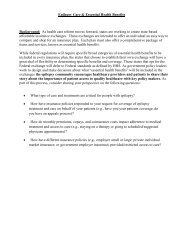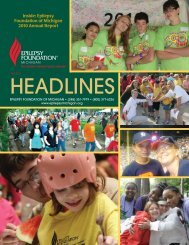Legal Rights of Children with Epilepsy in School & Child Care
Legal Rights of Children with Epilepsy in School & Child Care
Legal Rights of Children with Epilepsy in School & Child Care
Create successful ePaper yourself
Turn your PDF publications into a flip-book with our unique Google optimized e-Paper software.
Special Education and Students <strong>with</strong> <strong>Epilepsy</strong>: Specific Issues<br />
6.17Q: What happens if a student <strong>with</strong> epilepsy needs extra time to complete<br />
schoolwork or a test because <strong>of</strong> seizures or side effects from medication?<br />
A: If needed, extra time must be provided to a student <strong>with</strong> epilepsy to complete<br />
schoolwork or a test because <strong>of</strong> seizures or side effects from medication. This is<br />
a reasonable modification under Section 504 that should be <strong>in</strong>cluded on the<br />
student’s Section 504 plan. Under the IDEA it is an accommodation that would<br />
need to be reflected on the student’s IEP.<br />
6.18Q: Must a school modify requirements for academic honors or other<br />
recognition programs to take a student’s epilepsy <strong>in</strong>to account?<br />
A: Yes and no. A school is not required to modify fundamental requirements for<br />
academic honors for students <strong>with</strong> epilepsy or other disabilities, although certa<strong>in</strong><br />
requirements—such as those regard<strong>in</strong>g attendance—may be modified or waived<br />
for students <strong>with</strong> epilepsy or other disabilities if disability-related absences make<br />
them unable to meet an attendance requirement. But the student would have to<br />
meet the other requirements <strong>of</strong> the program—such as academic achievement,<br />
citizenship, or whatever the program is recogniz<strong>in</strong>g—unless prevented from<br />
do<strong>in</strong>g so by his or her disability. If a student <strong>with</strong> epilepsy receives<br />
modifications—such as extra time to complete work because <strong>of</strong> epilepsy-related<br />
issues such as medication side effects, and is still unable to meet the academic<br />
requirements <strong>of</strong> an honors program—the honors program does not have to lower<br />
its academic standards to <strong>in</strong>clude the student.<br />
In Hornst<strong>in</strong>e v. Moorestown Board <strong>of</strong> Educ., 263 F. Supp.2d 887 (D. N.J. 2003),<br />
the court held that schools may not discrim<strong>in</strong>ate aga<strong>in</strong>st people <strong>with</strong> disabilities<br />
<strong>in</strong> the application <strong>of</strong> criteria for honors or other recognition programs. The<br />
school district at issue attempted to change its valedictorian policy just prior to<br />
graduation to prevent a student <strong>with</strong> chronic fatigue syndrome from becom<strong>in</strong>g<br />
valedictorian because <strong>of</strong> concerns about the fairness <strong>of</strong> her grades, s<strong>in</strong>ce she had<br />
received much <strong>of</strong> her education <strong>in</strong> a home-based program. The court issued a<br />
restra<strong>in</strong><strong>in</strong>g order prevent<strong>in</strong>g the district from chang<strong>in</strong>g its policy. It seems clear<br />
though, that at some po<strong>in</strong>t if too many modifications are sought, the person <strong>with</strong><br />
a disability will not be considered “otherwise qualified” or the modifications<br />
will be considered a fundamental alteration <strong>of</strong> the program and will not be<br />
upheld.<br />
6.19Q: Must a school modify its requirements to permit a student <strong>with</strong> epilepsy to<br />
participate on sports teams?<br />
A: Yes, a school must modify its eligibility requirements to permit a student <strong>with</strong><br />
epilepsy to participate on a sports team to the extent that such modifications do<br />
not fundamentally alter the sports program and to the extent that the student can<br />
participate safely. For example, attendance requirements may need to be<br />
modified to permit the student to participate and, depend<strong>in</strong>g on the student’s<br />
90








